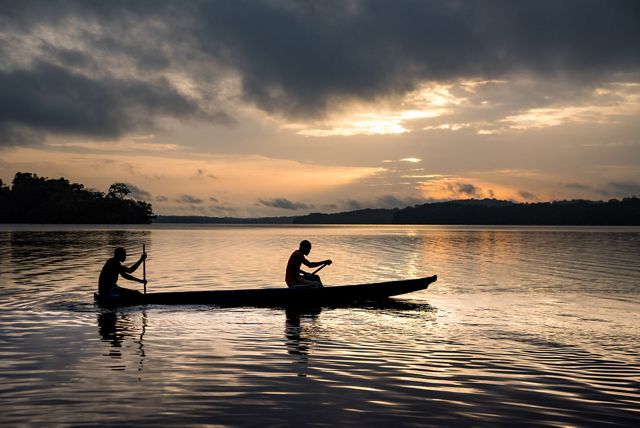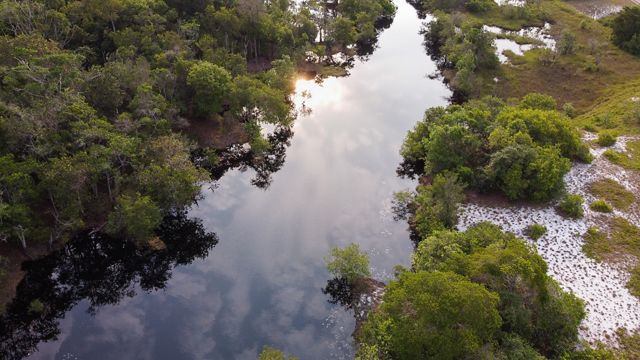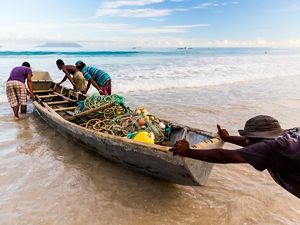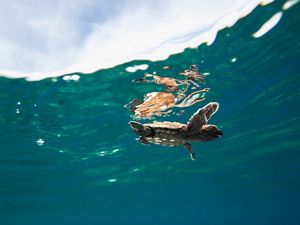Inspiring the World Through Action
Determined to protect 30 percent of its terrestrial, freshwater and marine habitats, Gabon is emerging as a conservation leader.
Gabon is a place of seemingly endless nature. Its forests blanket the land. Its rivers bend and tumble and nourish. Its ocean leaps with life.
Along the Atlantic Coast, hippos bellow from river shallows and wade into saltwater waves. Clusters of juvenile sea fish flit among the protective roots of mangroves, while thousands of leatherback and olive ridley turtles, the largest congregations in the Atlantic, lay their eggs on the sandy beaches.
Further inland, a significant proportion of the world’s remaining western lowland gorillas roam with chimpanzees, tufty eared red river hogs, African forest buffalo and different types of antelope, like delicately featured duikers and marsh-dwelling sitatunga. Over 700 species of birds flutter and trill, while rare slender-snouted and African dwarf crocodiles navigate watery caves and wooded streams bearing nutrients to the sea.
Much of Gabon remains wild and remote. With more than four-fifths of the nation’s population living in urban areas, 88 percent of the country is covered with trees, home to reclusive, critically endangered forest elephants. Gabon’s inland and coastal forests are so vast, they sequester more carbon dioxide each year than the amount produced by 30 million cars, helping the world stave off climate change through the natural process of photosynthesis.

Funding for Gabon's Oceans
A Blue Bonds for Ocean Conservation project, announced in 2023, is expected to unlock $163 million in funding for marine conservation in Gabon in support of commitments to protect 30% of its ocean.
As intact ecosystems and species diversity rapidly diminish around the world, the stakes are high for conserving extensive habitats like what remain in Gabon. But long-term, durable and effective protection can be expensive and extremely complex. Gabon is committed to being a leader in this space and a model to others in Africa and around the world.
“It is very crucial for the world to acknowledge the importance of biodiversity,” says Stanislas Stephen Mouba, director general for environmental protection in the Ministry of Environment of Gabon. It is important for both the economy and for people, he says.

Support Our Work in Gabon
Your support helps take on-the-ground action in Gabon and more than 70 other countries.
Take Action NowBig Ambitions
Much of Gabon’s economic growth has come from the export of natural resources like oil and manganese, but oil revenues are declining. With approximately 800,000 young Gabonese on track to enter the work force in the next decade or so, the government must create new jobs and find a way to do this in balance with its ambitious environmental goals.
“We are convinced that investment in biodiversity conservation and natural capital is critical for human wellbeing,” Lee White, Gabon’s former minister of water, forests, the sea and environment, told attendees at a high-level meeting on global biodiversity protection hosted by Colombia in 2021.
For example, a switch to sustainable forestry and a ban on the export of whole-log timber was a way to protect forests and create jobs. “Traditionally, we exported logs from Gabon to the rest of the world,” says White. “When you export a log, you are retaining about eight percent of the value of the wood, and so you’re gifting over 90 percent of the value added to the country that imports your log and transforms it into furniture or parquet or [other items].” Producing these finished wood products locally will keep profits in Gabon.
Payment for carbon dioxide captured by healthy forests is also bringing in funds. Last year, Gabon received the first installment of US$150 million from Norway, through the Central African Forest Initiative, in exchange for demonstrated progress in forest protection and emissions reductions. The hope is this will lead to future payment structures that compensate Gabon for its forests’ contribution to mitigating global climate change.
Gabon is part of the High Ambition Coalition, a group of over 100 countries advocating for a global commitment through the UN Convention on Biological Diversity to protect 30 percent of the world’s land and ocean by 2030 (often referred to as 30x30). It is one of several countries pushing for the inclusion of a 30 percent goal for freshwater as well. For a nation whose culture and landscape are shaped by its rivers, this expanded 30:30:30 goal has a special significance.
“Over the last three decades, Gabon has been gradually building the laws and institutions that we need to preserve forests and ecosystems,” says White.
Gabon announced its plan to create a series of protected areas in 2002 and established the National Agency for National Parks (Agence Nationale des Parcs Nationaux) in 2007. It now has 13 national parks and two World Heritage sites, plus nine Ramsar Wetlands of International Importance, which cover a total of about 22 percent of the country. Offshore, Gabon has established 20 marine protected areas across 20,060 square miles (51,955 sq km), which represent about 26 percent of its ocean territory.
Managing these areas remains a challenge, however, due to variable protection designations and limited funds. The isolation of Gabon’s natural habitats means they are harder to access, but it also makes them harder to steward. Marine protected areas are distinctly difficult to monitor, and they are easily accessible to the fishing boats drawn from around the region to Gabon’s bountiful offshore ecosystems.
Taking Conservation to the Next Level
To help meet its ambitious goals, Gabon is partnering with organizations, like The Nature Conservancy (TNC), who have the expertise to advise on science-based conservation and land-use plans and the creation of transformational, lasting protection initiatives. “Our deep experience in protected area creation and implementation,” says White, “teaches us that measuring, monitoring and protection efforts in data-poor, biodiverse countries like Gabon will require a disproportionate burden on resources—financial, technical, human and other.” Motivating the right expertise and support will be essential to success.
TNC began working in Gabon nine years ago, with a focus on freshwater. Every year, more than six feet (nearly two meters) of rainfall move through the vast Ogooué River watershed, which contains some of the last free-flowing large rivers on Earth. Gabon wants to harness some of this hydropower in order to shift away from an oil-based economy.
But how can the country do this in a way that minimizes the impact on natural habitats and local livelihoods? Hundreds of species of fish live in the country’s rivers and streams, and a third of them live nowhere else on Earth. With freshwater, as with terrestrial and marine conservation, TNC started with science, mapping and classifying species and habitats and water flows to create a decision-support tool that could guide conservation and sustainable development in the basin.
The 30:30:30 goal will require partnership and funding on a level not seen in traditional conservation efforts. TNC is now doing the groundwork for the possible use of a series of powerful tools to facilitate durable, long-term protection. “We’re hoping to be a catalyst,” says Marie-Claire Paiz, TNC’s Gabon country director, “bringing science, expertise, partnerships and financial resources to create a new way of doing conservation, so that what we’re doing today will really remain, and we’ll see the benefits in another 10, 30, 50 years from now.”
A Blue Bonds Project for Gabon's Ocean
A Toolkit for Durable Conservation
One of the challenges facing durable conservation, where protected areas are monitored and stewarded in perpetuity, is the ups and downs of funding availability from public and private sources. Mechanisms like project finance for permanence, which TNC is deploying through the Enduring Earth partnership, help bring significant funds together at the start of a project, creating legal and financial structures to ensure protected areas are not just lines on paper, but monitored and stewarded for years to come.
The project finance for permanence (PFP) approach helps countries ramp up the pace and scale of conservation to meet large-scale regional and global goals. It also emphasizes working with local communities to increase the long-term success of conservation planning and management. Successful PFP projects have been completed in Canada, Costa Rica, the Brazilian Amazon, Bhutan and Peru.
At the December 2022 UN Biodiversity Conference in Montreal, Gabon announced its commitment to pursue a PFP project. The effort will support the protection of more than 24,000 square kilometers of forest, 8,000 square kilometers of ocean and 4,800 kilometers of river. Improved forest management is expected to contribute the equivalent of 30 million tons of carbon mitigation annually.
A complementary approach to facilitating durable conservation is the successful Blue Bonds for Ocean Conservation program, which TNC is expanding into a new Nature Bonds Program to achieve large-scale outcomes for terrestrial, freshwater and marine ecosystems and for the world’s climate.
The Blue Bonds for Ocean Conservation program helps countries refinance a portion of their debt to unlock funding to increase protections and improve management for up to 30% of their marine space.
In 2023 TNC worked with Gabon, with support from Bank of America and the U.S. International Development Finance Corporation, to finalize a Blue Bonds project that is expected to unlock approximately $163 million in funding over 15 years and establish an independent conservation fund. Now the Government of Gabon will lead a multi-year, participatory marine spatial planning process aimed at increasing the extent and durability of its ocean conservation measures.

Balancing the Needs of Nature and Local Communities
“In Gabon, life is built around water,” explains Jean Churley Manfoumbi, manager of TNC’s freshwater and community-based conservation program in Gabon. “The river provides people with water to quench their thirst and food to eat through fishing.” The names of provinces are linked to river systems, the style of hand-carved boat paddles reflects the prevailing currents and character of local rivers, and many Gabonese who have moved to the cities to work or access services still return to their home villages during the dry season, when water levels are low and fishing can be more productive.
Outside of the cities, population centers are smaller and more dispersed. Local communities, which include Gabon’s many Bantu and forest-dwelling ethnic groups, rely directly on healthy ecosystems for food and livelihoods. Yet crops can be damaged by elephants, whose movements are shifting due to climate change and other factors like poaching. Forest allocations and park boundaries can conflict with community lands and local traditions. Hydroelectric projects can disrupt populations of river fish.
An integral part of successful, long-term conservation is addressing the needs and rights of local communities. Conservation efforts are stronger and more effective when Indigenous Peoples and local communities are included as stewards, knowledge- and rights-holders, and beneficiaries.
TNC is working with a local NGO partner, Organisation Ecologique des Lacs et de l’Ogooué (OELO), to conduct early initiatives in community-based conservation around Lake Oguemoué and other areas. Together, TNC and OELO are gathering social and ecological data, exploring sustainable economic options for residents—from community forests to fishing cooperatives—and conducting a pilot project in the use of low-tech elephant fencing to protect crops.
“I believe that nature is the future,” says Rengouwa Maeva, local resident and OELO’s sustainable fishing program coordinator, “because to become self-sufficient, we have to turn to nature.”
With the right planning, partnership and action, Gabon’s wealth of diverse habitats, wildlife and people will thrive side-by-side. The Nature Conservancy is committed to helping the people of Gabon find this balance.
This article includes excerpts from video interviews conducted by Roshni Lodhia and Mike Pflanz, with logistical support from our Gabon and Africa teams.
PFP Disclosures
TNC is also partnering with the Government of Gabon to develop a Project Finance for Permanence (PFP) that would help fund Gabon’s ambitious 30x30 goals. The project is funded in part by the Global Environment Facility. Download the stakeholder engagement plan and the environmental and social management framework here:
Green Gabon: Taking 30x30 Further



Global Insights
Check out our latest thinking and real-world solutions to some of the most complex challenges facing people and the planet today.



